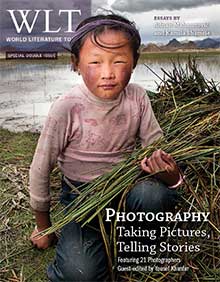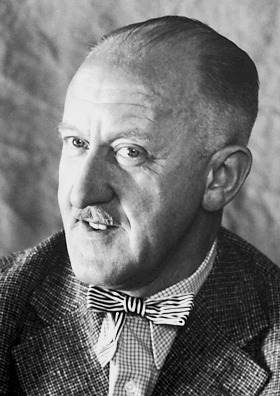
Halldór Kiljan Laxness was an Icelandic writer and winner of the 1955 Nobel Prize in Literature. He wrote novels, poetry, newspaper articles, essays, plays, travelogues and short stories. Writers who influenced Laxness included August Strindberg, Sigmund Freud, Knut Hamsun, Sinclair Lewis, Upton Sinclair, Bertolt Brecht and Ernest Hemingway.

Ismail Kadare is an Albanian novelist, poet, essayist, screenwriter, and playwright. He is a leading international literary figure and intellectual. He focused on poetry until the publication of his first novel, The General of the Dead Army, which made him famous internationally.

Katherine Womeldorf Paterson is an American writer best known for children's novels, including Bridge to Terabithia. For four different books published 1975–1980, she won two Newbery Medals and two National Book Awards. She is one of four people to win the two major international awards; for "lasting contribution to children's literature" she won the biennial Hans Christian Andersen Award for Writing in 1998 and for her career contribution to "children's and young adult literature in the broadest sense" she won the Astrid Lindgren Memorial Award from the Swedish Arts Council in 2006, the biggest monetary prize in children's literature. Also for her body of work she was awarded the NSK Neustadt Prize for Children's Literature in 2007 and the Laura Ingalls Wilder Medal from the American Library Association in 2013. She was the second US National Ambassador for Young People's Literature, serving 2010 and 2011.

Naomi Shihab Nye is an Arab American poet, editor, songwriter, and novelist. Born to a Palestinian father and an American mother, she began composing her first poetry at the age of six. In total, she has published or contributed to over 30 volumes of poetry. Her works include poetry, young-adult fiction, picture books, and novels. Nye received the 2013 NSK Neustadt Prize for Children's Literature in honor of her entire body of work as a writer, and in 2019 the Poetry Foundation designated her the Young People's Poet Laureate for the 2019–21 term.
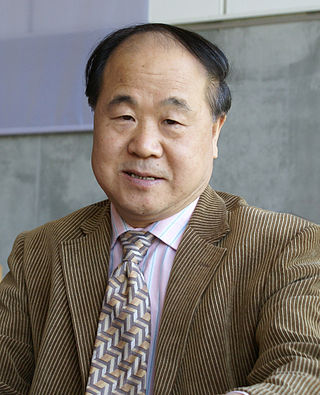
Guan Moye, better known by the pen name Mo Yan, is a Chinese novelist and short story writer. Donald Morrison of U.S. news magazine TIME referred to him as "one of the most famous, oft-banned and widely pirated of all Chinese writers", and Jim Leach called him the Chinese answer to Franz Kafka or Joseph Heller. In 2012, Mo was awarded the Nobel Prize in Literature for his work as a writer "who with hallucinatory realism merges folk tales, history and the contemporary".
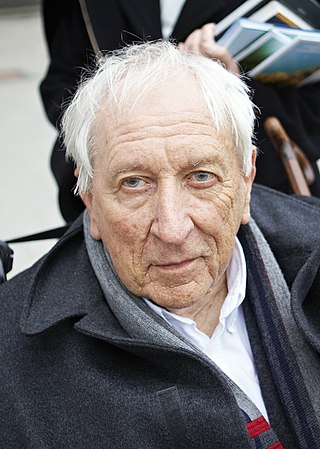
Tomas Gösta Tranströmer was a Swedish poet, psychologist and translator. His poems captured the long Swedish winters, the rhythm of the seasons and the palpable, atmospheric beauty of nature. Tranströmer's work is also characterized by a sense of mystery and wonder underlying the routine of everyday life, a quality which often gives his poems a religious dimension. He has been described as a Christian poet.
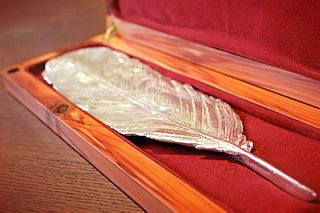
The Neustadt International Prize for Literature is a biennial award for literature sponsored by the University of Oklahoma and its international literary publication, World Literature Today.

Nuruddin Farah is a Somali novelist. His first novel, From a Crooked Rib, was published in 1970 and has been described as "one of the cornerstones of modern East African literature today". He has also written plays both for stage and radio, as well as short stories and essays. Since leaving Somalia in the 1970s he has lived and taught in numerous countries, including the United States, Britain, Germany, Italy, Sweden, Sudan, India, Uganda, Nigeria and South Africa.

Meshack Asare is a popular African children's author. He was born in Ghana and currently resides in Degenfeld, Germany. On 15 July 2014, he was announced as a finalist for the prestigious international award, the 2015 NSK Neustadt Prize for Children's Literature, which he won on 24 October 2014, becoming the first African to receive the award. The Brassman's Secret was his representative text read by the nominating jury, and the award honors his entire body of work.
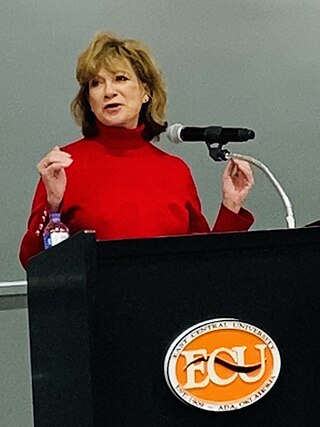
Rilla Askew is an American novelist and short story writer who was born in Poteau, in the Sans Bois Mountains of southeastern Oklahoma, and grew up in the town of Bartlesville, Oklahoma.
Louis Dean Owens was a novelist and scholar who claimed Choctaw, Cherokee, and Irish-American descent. He is known for a series of Native-themed mystery novels and for his contributions to the then-fledgling field of Native American Studies. He was also a professor of English and Native American studies, and frequently contributed articles, literary criticism and reviews to periodicals. Owens died by suicide in 2002.
Virginia Euwer Wolff is an American author of children's literature. Her award-winning series Make Lemonade features a 14-year-old girl named LaVaughn, who babysits for the children of a 17-year-old single mother. There are three books. The second, True Believer, won the 2001 National Book Award for Young People's Literature. The second and third, This Full House (2009), garnered Kirkus Reviews starred reviews. She was the recipient of the 2011 NSK Neustadt Prize for Children's Literature, honoring her entire body of work.
Ivar Vidrik Ivask was an Estonian poet and literary scholar.
Vera Baker Williams was an American children's writer and illustrator. Her best known work, A Chair for My Mother, has won multiple awards and was featured on the children's television show Reading Rainbow.
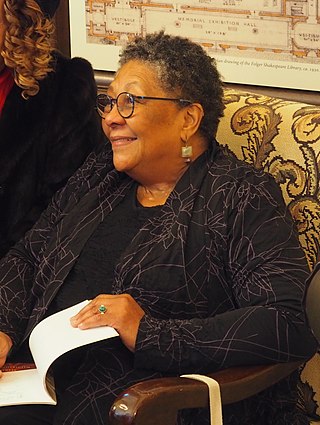
Marilyn Nelson is an American poet, translator, biographer, and children's book author. She is a professor emeritus at the University of Connecticut, and the former Poet Laureate of Connecticut. She is a winner of the Ruth Lilly Poetry Prize, the NSK Neustadt Prize for Children’s Literature, and the Frost Medal. From 1978 to 1994, she published under the name Marilyn Nelson Waniek. She is the author or translator of more than twenty books and five chapbooks of poetry for adults and children. While most of her work deals with historical subjects, in 2014 she published a memoir, named one of NPR's Best Books of 2014, entitled How I Discovered Poetry.

The Nobel Prize in Literature is a Swedish literature prize that is awarded annually, since 1901, to an author from any country who has, in the words of the will of Swedish industrialist Alfred Nobel, "in the field of literature, produced the most outstanding work in an idealistic direction". Though individual works are sometimes cited as being particularly noteworthy, the award is based on an author's body of work as a whole. The Swedish Academy decides who, if anyone, will receive the prize. The academy announces the name of the laureate in early October. It is one of the five Nobel Prizes established by the will of Alfred Nobel in 1895. Literature is traditionally the final award presented at the Nobel Prize ceremony. On some occasions, the award has been postponed to the following year, most recently in 2018.

The NSK Neustadt Prize for Children's Literature is an international children's literary award founded in 2003 and given every odd-number year by World Literature Today. The prize is an offshoot of the Neustadt International Prize for Literature. Nancy Barcelo, Kathy Neustadt, and Susan Neustadt Schwartz, the daughters of Walter Jr. and Dolores Neustadt and the granddaughters of Walter Sr. and Doris Westheimer Neustadt, established the prize to “enhance the quality of children's literature by recognizing writing that contributes to the quality of children's lives.”
Mildred DeLois Taylor is a Newbery Award-winning American young adult novelist. She is best known for her novel Roll of Thunder, Hear My Cry, part of her Logan family series.

The 2012 Nobel Prize in Literature was awarded to the Chinese writer Mo Yan "who with hallucinatory realism merges folk tales, history and the contemporary." He is the second Chinese author to win the prize after the exiled Gao Xingjian.

The 2000 Nobel Prize in Literature was awarded to the Chinese émigré writer Gao Xingjian "for an æuvre of universal validity, bitter insights and linguistic ingenuity, which has opened new paths for the Chinese novel and drama." He is the first Chinese recipient of the prize followed by Mo Yan in 2012.
